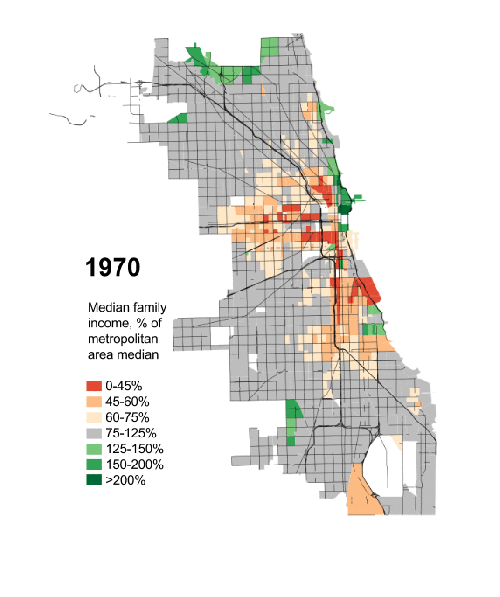April 3, 2014 11:12 AM
CHICAGO (CBS) — The graphic that you are about to see is sobering, perhaps depressing, and you can’t take your eyes off it.
We have the exhaustive work of Daniel Kay Hertz, a masters student at the University Of Chicago’s Harris School of Public Policy, to thank for that.
At the risk of sounding like an old carnival barker, step right up and watch the middle class of Chicago vanish before your eyes.
However, this is no side-show.
It shows the demise of the foundation of an American city.
Watch as the grey squares, which illustrate the middle class that dominated the most of the city’s neighborhoods in 1970s, quickly vanish over 40 years.
The poor, represented by the orange and red colors, explode across the map.
And watch what happens in the green areas representing the upper middle class and wealthy. Not surprisingly, it spreads from downtown to the north side, but not with the same ferocity as the reds and oranges.
Especially in 2000, the greens-the color of money–grow much darker. It seems the rich simply got richer. In later years, the wealthy pushed the poor out of the near West Side. It appears that area bypassed the middle.
The data comes from the U.S. Census.
In his blog, Hertz says he fears that the often-told story of segregation and income inequality in Chicago has led to apathy.
“These facts somehow seep out of the ground here, as much a part of the city as the lake, and that as a result there’s really nothing we can do about it,” Hertz writes.
Hertz says the work isn’t meant to be depressing. Not along ago, he reasons, there was a large vibrant middle class in Chicago, and it is possible to get it back.
The goal of the maps “is not merely to depress you (you’re welcome!), but to suggest just how dramatically the reality of Chicago’s ‘two cities’ has changed over the last few generations, how non-eternal its present state is, and that a happier alternate reality isn’t just possible, but actually existed relatively recently.”

No comments:
Post a Comment